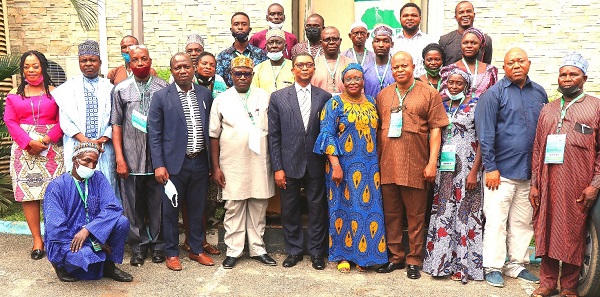
The country coordinator of the Open Forum on Agricultural Biotechnology (OFAB) in Africa, Nigeria Chapter, Dr. Rose Gidado was the chair of the journalists and science communicators focused group discussion (FGD) at the fourth edition of the African Biennial Bioscience Communication (ABBC) held recently in Abuja, Nigeria.
The symposium provided a platform for exchange of experiences and strategies for furthering the progress of Africa’s biotechnology sector and to reflect on the progress that African countries have made in the adoption of biotech crops, as well as discussions and strategies on how to harness the gains for the continent’s journey to self-reliance took place.
All the six African countries leading in biotechnology adoption – Nigeria, Malawi, Ethiopia, Kenya, Uganda and Ghana – participated in the six-session symposium, comprising sessions for policymakers, journalists/science communicators, regulators, scientists/researchers, private sector, farmers and genome editing sessions. Each session covered an important facet of bioscience communication and challenges discussed with proposed solutions.
Chairing the journalists/science communicators FGD, Dr. Gidado conducted the session through three key questions, namely; rating the effectiveness of the current coverage of agricultural biotech in Nigeria, expounding with examples on how best to get the public to know and experience biotechnology and what journalists and communicators can do to improve public understanding of biotech. After deliberations, each country made a presentation of their findings to all the other participants virtually.
Earlier, the guest speaker for the science journalist and communicators session, editor-in-chief, AfricaSTI and former vice-president, World Federation of Science (WFSJ), Diran Onifade called on journalists to report accurate and balanced stories because covering science is different from general news coverage.
Another speaker at the session, the OFAB Africa project manager, Vitumbiko Chinoko, gave a comprehensive lecture on “Effective Biotech and Biosafety Communications: Lessons from the Open Forum on Agricultural Biotechnology (OFAB) in Africa.” He said OFAB is about covering the space and sharing knowledge about agricultural biotechnology among journalists, scientists, civil society organisations, lawyers and policymakers.
On the other hand, the director-general of the National Biotechnology Development Agency (NABDA), Prof. Abdullahi Mustapha chaired the policy dialogue session while the regulators’ focal group was chaired by the director-general, National Biosafety Management Agency (NBMA), Dr. Rufus Ebegba.
Margret Karembu welcomed the participants before the symposium was declared open by Prof. Aggrey Ambali, head of Science, Technology and Innovation Hub, AUDA-NEPAD Agency who pledged AUDA-NEPAD’s support for biotechnology in general and genome editing in particular. He noted that technology is an additional tool that will enhance precision inbreeding, with adoption that relies solely on policy.
Other speakers at the opening of the symposium were global coordinator of Malaysia-based ISAAA, Dr. Mahaletchumy Arujanan; Administrator of USDA’s chief scientific in-house research agency, Chavonda Jacobs-Young and AATF executive director, Dr. Canisius Kanangire.
Prof. Jennifer Thomson of the Department of Molecular and Cell Biology, University of Cape Town, South Africa, delivered the keynote speech. Thomson highlighted that in some jurisdictions such as the European Union, biotechnology regulation has not been based on science; thus, it would be wrong for other geographies to copy-paste EU systems. Meanwhile, Priscila Quaini Jacobitz, a government affairs manager of CropLife Europe, agreed that while the EU is not a big place for motivation due to several reasons, it is a destination market and an importer of GM crops. The EU, she said, imports 97 per cent soybean from Brazil and Argentina, meaning that the EU consumes GM products especially as livestock feed, except that they prefer to import than grow.
On the sidelines of the symposium, awards were conferred on six scientists and researchers who have shown commitment to the development of biotechnology in the six focus countries in Africa. The awards aimed to encourage them to continue with the good work. ABBC involved country-level committees to nominate and select the awardees using a predetermined criterion that included considerations such as commitment to the scientific course, activeness in the media and release of a product.
The awardees were Dr. Tedesa Daba, director at the Biotechnology Research Directorate of Ethiopia Institute of Agricultural Research; Prof. Marian Dorcas Quain, a renowned biotechnologist that has worked on numerous crops with focus on the utilisation of tissue culture for production of clean planting materials – Ghana; Dr. Charles Waturu, a retired director of Horticultural Research Institute who holds a Ph.D in crop protection from the University of Reading, UK – Kenya and Prof. James Bukosi of the Lilongwe University of Agriculture and Natural Resource. Bukosi was the first Bt. cotton trial manager in Malawi and the chair of the agriculture and natural resources committee of the National Commission for Science and Technology in Malawi – Malawi.
Others are Prof. Mohammad Ishiyaku, Bt Cowpea lead scientist and the executive director, Institute for Agricultural Research (IAR) Nigeria – Nigeria and Dr. Tushemereirwe Wilberforce, a banana breeder and current director of research at the National Agricultural Research Laboratories at NARO – Uganda.
The awards session was presided over by Prof. Ratemo Michika.

